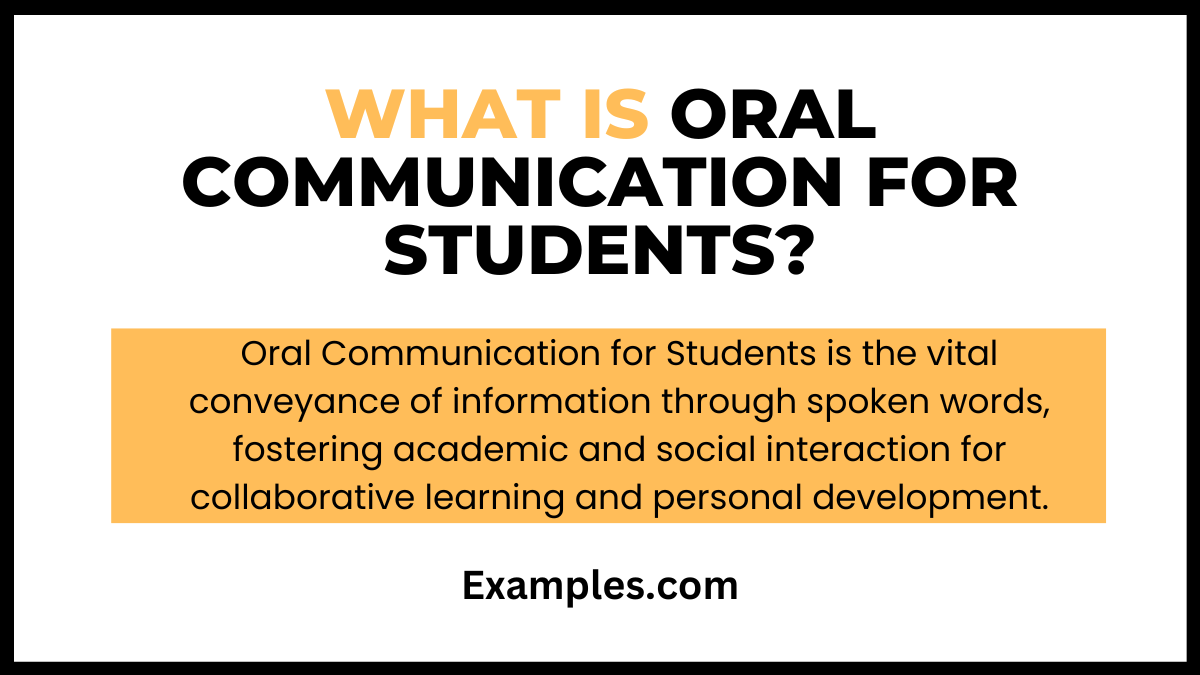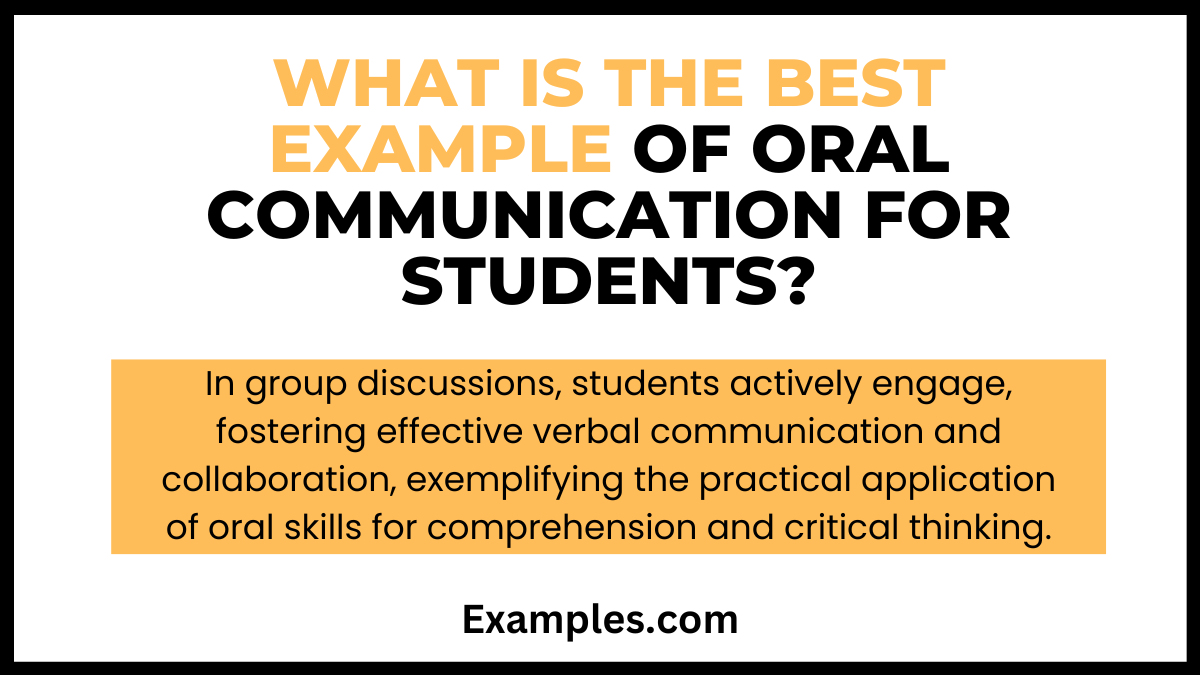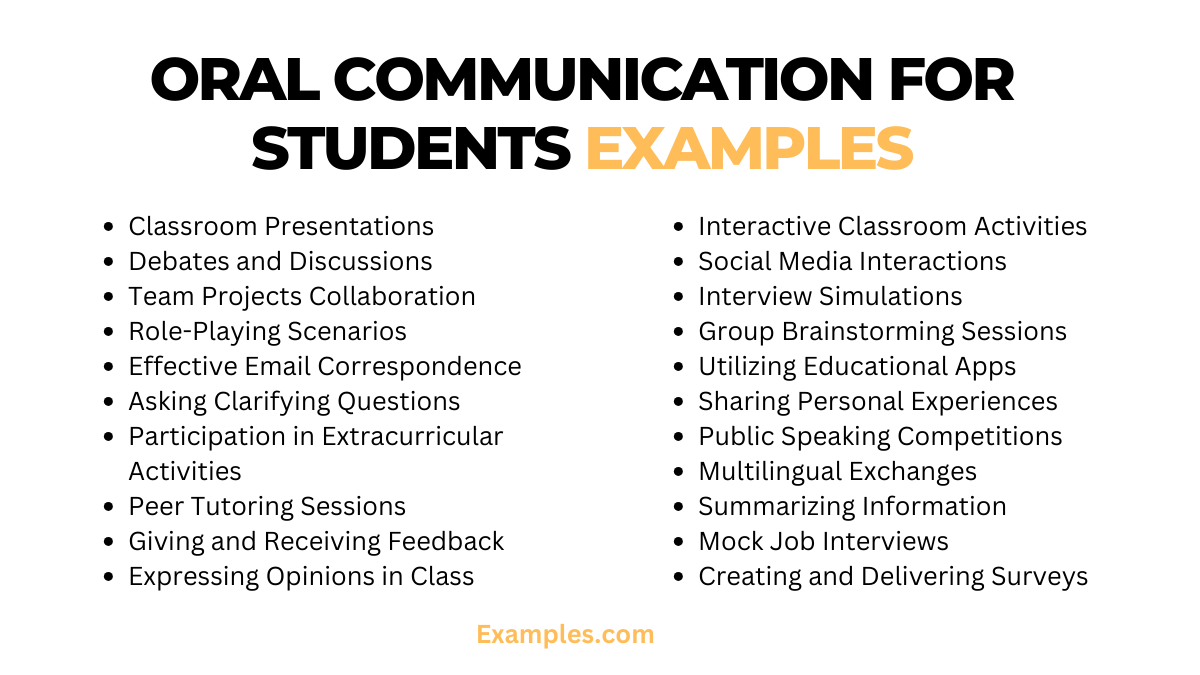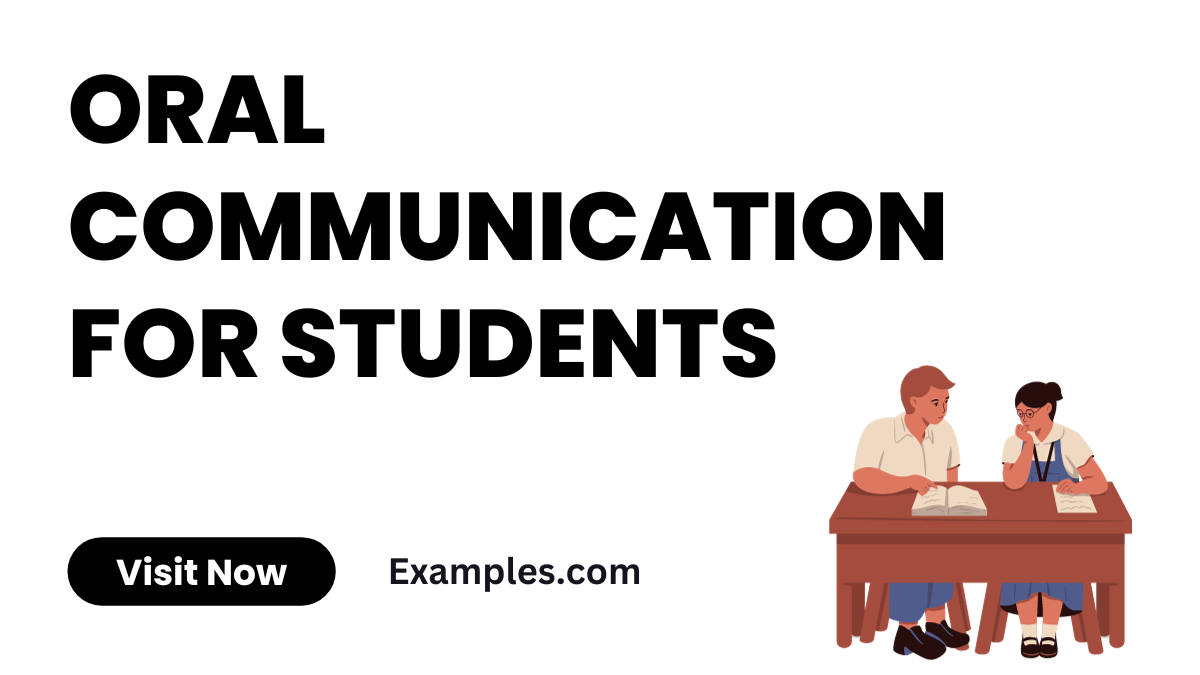29+ Oral Communication for Students Examples
Embark on a comprehensive journey through Oral Communication for Students, delving into the nuances of effective communication strategies. Uncover the importance of honing communication skills in various student scenarios, from classrooms to workplaces. This guide offers practical tips, insightful advice, and a curated collection of Communication Examples to enhance your proficiency. Elevate your interpersonal skills, navigate diverse settings, and empower yourself with the art of impactful communication in both academic and real-life contexts.
What is Oral Communication for Students?

Oral Communication for Students encompasses the conveyance of information through spoken words, fostering interaction in academic and social settings. It involves verbal and nonverbal elements, emphasizing clarity, understanding, and effective expression. This vital skill contributes to collaborative learning, interpersonal relationships, and personal development.
What is the Best Example of Oral Communication for Students?

A noteworthy instance is group discussions where students actively share insights, seek clarification, and engage in constructive dialogue. This promotes effective verbal communication, active listening, and collaborative interaction, exemplifying the practical application of oral skills in academic settings. Such exchanges enhance comprehension, critical thinking, and social connectivity among students.
30 Oral Communication for Students Examples

Oral communication for students is dynamic and multifaceted, encompassing various scenarios that enhance their interpersonal and academic skills.
- Classroom Presentations: Students articulate ideas confidently, enhancing public speaking skills and knowledge sharing.
- Debates and Discussions: Engaging in debates hones critical thinking, fostering effective argumentation and communication.
- Team Projects Collaboration: Cooperative efforts in projects develop teamwork and communication abilities.
- Role-Playing Scenarios: Simulating real-life situations enhances communication skills in various contexts.
- Effective Email Correspondence: Learning to compose concise and clear emails is crucial for professional communication.
- Asking Clarifying Questions: Seeking understanding through questions promotes active and clear communication.
- Participation in Extracurricular Activities: Involvement in clubs and events enhances social communication skills.
- Peer Tutoring Sessions: Teaching peers reinforces understanding and effective explanation techniques.
- Giving and Receiving Feedback: Constructive feedback improves communication and aids in personal development.
- Expressing Opinions in Class: Encouraging students to voice opinions fosters open and respectful communication.
- Interactive Classroom Activities: Engaging activities promote communication skills and collaborative learning.
- Social Media Interactions: Responsible online communication builds digital communication proficiency.
- Interview Simulations: Preparing for interviews sharpens verbal and nonverbal communication during professional encounters.
- Group Brainstorming Sessions: Collaborative idea generation enhances creativity and verbal expression.
- Utilizing Educational Apps: Integrating technology aids in effective communication through various platforms.
- Sharing Personal Experiences: Narrative communication builds connections and enriches social understanding.
- Public Speaking Competitions: Participation in competitions refines presentation skills and boosts confidence.
- Multilingual Exchanges: Communicating in multiple languages fosters cultural understanding and language proficiency.
- Summarizing Information: Students develop concise communication skills by summarizing complex information.
- Mock Job Interviews: Simulating job interviews prepares students for professional communication in the workforce.
- Creating and Delivering Surveys: Designing surveys encourages effective questioning and data collection.
- Participating in Model United Nations (MUN): MUN activities enhance diplomacy and communication on global issues.
- Negotiation Exercises: Simulating negotiations sharpens persuasive and interpersonal communication skills.
- Collaborative Writing Projects: Group writing projects improve communication through shared ideas and contributions.
- Organizing and Leading Group Discussions: Taking a leadership role in discussions builds communication and facilitation skills.
- Community Service Involvement: Volunteering activities encourage communication in diverse and community-oriented settings.
- Engaging in Q&A Sessions: Responding to questions sharpens impromptu communication skills.
- Peer-to-Peer Mentoring: Mentorship interactions facilitate effective communication and knowledge transfer.
- Participating in Drama or Theater: Theatrical activities enhance expressive and dramatic communication skills.
- Creating Educational Podcasts: Producing podcasts encourages clear and engaging communication for a broader audience.
Oral Communication for Students in Classroom Examples
Oral communication skills are paramount for students within the classroom environment, shaping their academic journey and future professional endeavors.
- Classroom Presentations: Effectively communicate ideas through organized and engaging presentations, fostering a confident speaking style.
- Question-and-Answer Sessions: Participate actively in Q&A sessions, promoting clarity and understanding among peers and educators.
- Classroom Discussions: Engage in constructive discussions, articulating thoughts, and actively listening to diverse perspectives.
- Team Projects Coordination: Communicate seamlessly within teams, ensuring efficient coordination and collaboration on academic projects.
- Teacher-Student Interactions: Seek clarification and guidance through effective communication with teachers, enhancing the learning experience.
- Class Debates: Participate in class debates, showcasing persuasive communication skills and the ability to articulate arguments.
- Group Problem-Solving: Collaborate in solving academic problems, demonstrating effective communication in a team setting.
- Peer Tutoring: Communicate complex concepts to peers during tutoring sessions, promoting a supportive learning environment.
- Classroom Polls and Surveys: Engage in data collection through polls, demonstrating effective communication for research purposes.
- Classroom Reflections: Articulate personal insights and reflections on lessons, showcasing critical thinking through verbal expression.
Oral Communication for Students in Elementary School Examples
Oral communication skills are foundational for elementary students, fostering social interaction and learning. Here are examples that promote effective communication in this setting:
- Show and Tell Sessions: Encourage students to express themselves by presenting personal items, enhancing verbal communication skills.
- Storytelling Circles: Engaging in storytelling nurtures creativity and helps students articulate ideas in a structured manner.
- Role-playing Games: Interactive games enable students to communicate effectively, promoting cooperation and imaginative expression.
- Class Discussions: Encourage open dialogue to enhance listening and speaking skills, creating a communicative classroom environment.
- Peer Conversations: Structured peer interactions develop conversational skills, promoting active listening and expressive communication.
- Public Speaking Challenges: Simple speaking tasks build confidence, preparing students for future academic and social communication.
- Interview Practice: Simulating interviews helps develop communication skills necessary for various life situations.
- Problem-Solving Scenarios: Encouraging discussions on real-world issues fosters critical thinking and effective communication.
- Collaborative Art Projects: Group activities promote communication, requiring students to discuss ideas and coordinate efforts.
- Role-based Story Creation: Assigning roles for story creation enhances teamwork and oral communication as students contribute to a collective narrative.
Oral Communication for Students in Workplace Examples
Effective oral communication is vital in the workplace, facilitating collaboration and professional success. Here are workplace-oriented examples:
- Meeting Presentations: Delivering concise and impactful presentations in meetings enhances workplace communication skills.
- Client Communication: Articulate and clear communication with clients builds trust and ensures successful collaboration.
- Team Briefings: Clearly conveying information during team briefings fosters a cohesive work environment.
- Negotiation Skills: Mastering negotiation language and tactics enables effective communication in business dealings.
- Conflict Resolution Discussions: Addressing conflicts through open dialogue promotes a healthy work atmosphere.
- Project Updates: Providing clear and regular project updates ensures everyone is on the same page, enhancing teamwork.
- Training Sessions: Conducting informative training sessions requires effective verbal communication skills to convey complex information.
- Networking Events: Mingling and communicating effectively at networking events is crucial for professional growth.
- Performance Reviews: Delivering and receiving constructive feedback in performance reviews requires tactful oral communication.
- Elevator Pitch: Crafting a compelling elevator pitch improves the ability to concisely communicate ideas in a professional setting.
How Does Oral Communication Help You as a Student?
Oral communication plays a pivotal role in the academic journey, offering multifaceted benefits for students. From fostering interpersonal skills to aiding in academic success, here’s a comprehensive guide on how oral communication positively impacts students:
1. Enhanced Understanding and Retention:
Oral communication, through discussions and interactive sessions, helps students grasp complex concepts more effectively. Engaging in conversations facilitates a deeper understanding and improves retention of academic material.
2. Development of Critical Thinking Skills:
Participating in oral discussions encourages students to think critically, analyze information, and formulate articulate responses. This process enhances their ability to approach problems with a thoughtful and analytical mindset.
3. Improved Academic Performance:
Students who actively engage in oral communication tend to perform better academically. Discussing topics, asking questions, and explaining concepts to peers contribute to a more thorough understanding of the subject matter.
4. Cultivation of Interpersonal Skills:
Oral communication fosters the development of crucial interpersonal skills. Students learn how to express their thoughts, actively listen to others, and navigate diverse perspectives, contributing to their overall social and emotional intelligence.
5. Effective Collaboration and Teamwork:
In group projects and collaborative assignments, oral communication is essential for effective teamwork. Students learn to communicate ideas, delegate tasks, and resolve conflicts, preparing them for future professional endeavors.
6. Confidence Building:
Actively participating in oral communication activities, such as presentations and debates, contributes to the development of confidence. The ability to articulate thoughts and ideas in front of peers enhances self-assurance.
7. Preparation for Real-World Communication:
Engaging in oral communication in an academic setting prepares students for real-world scenarios. The skills acquired, including public speaking and effective expression, are transferable to various professional and personal contexts.
8. Cultural Awareness and Sensitivity:
Through oral communication, students interact with peers from diverse backgrounds, promoting cultural awareness and sensitivity. Understanding different perspectives contributes to a more inclusive and tolerant learning environment.
What are the factors affect your oral communication as a student?
Effective oral communication is influenced by various factors that shape a student’s ability to express thoughts and ideas. Understanding these factors is crucial for improving communication skills:
- Confidence Levels: Self-confidence significantly impacts how students articulate ideas. Building confidence through practice and positive reinforcement enhances communication.
- Cultural Background: Cultural differences can influence communication styles. Students from diverse backgrounds benefit from cultural sensitivity and cross-cultural communication skills.
- Language Proficiency: Proficiency in the language of communication plays a pivotal role. Language barriers may affect comprehension and expression, emphasizing the need for language development.
- Listening Skills: Effective oral communication relies on active listening. Students need to cultivate strong listening skills to comprehend information and respond appropriately.
- Nonverbal Cues: Body language, facial expressions, and gestures contribute to communication. Awareness and mastery of nonverbal cues enhance the overall effectiveness of oral communication.
- Environmental Distractions: External factors like noise, distractions, and interruptions in the environment can hinder effective communication. Creating a conducive space for communication is essential.
- Social Skills: Interpersonal skills impact how students engage in conversations. Developing social skills, such as empathy and cooperation, fosters positive communication interactions.
- Anxiety and Nervousness: Nervousness can impede communication. Strategies to manage anxiety, such as preparation and deep breathing, contribute to confident communication.
- Technology Usage: The integration of technology in communication requires students to adapt to various platforms and tools, influencing their communication methods.
- Educational Background: Previous educational experiences shape communication skills. Recognizing and addressing gaps in foundational communication skills aids improvement.
Understanding these factors enables students to navigate challenges, adapt to different communication scenarios, and continually enhance their oral communication abilities.
Tips for Effective Oral Communication for Students?
Mastering effective oral communication is a valuable skill for academic and personal success. Here are practical tips to enhance students’ communication abilities:
- Practice Active Listening: Actively engage in conversations by listening attentively, seeking clarification, and responding appropriately.
- Expand Vocabulary: Regularly introduce new words into your vocabulary to express ideas more precisely and diversify communication.
- Maintain Eye Contact: Establishing eye contact conveys confidence and sincerity, enhancing the impact of your communication.
- Organize Your Thoughts: Before speaking, organize your thoughts to deliver clear and coherent messages, avoiding unnecessary rambling.
- Utilize Nonverbal Cues: Be mindful of nonverbal cues like facial expressions and body language to complement verbal communication effectively.
- Participate in Group Activities: Collaborative activities develop teamwork and communication skills, fostering a comfortable speaking environment.
- Seek Constructive Feedback: Welcome feedback from peers or instructors to identify areas for improvement and refine communication skills.
- Utilize Technology Mindfully: Embrace technology for communication but be aware of its impact. Balance digital communication with face-to-face interactions.
- Cultivate Empathy: Understanding others’ perspectives enhances communication. Cultivate empathy to connect with diverse audiences.
- Practice Public Speaking: Engage in public speaking opportunities, such as class presentations or club activities, to build confidence and hone communication skills.
By incorporating these tips into daily communication practices, students can elevate their oral communication skills, contributing to academic success and preparing for future endeavors.
As the journey through oral communication for students culminates, it’s evident that mastering this skill is not just about academic prowess but also about personal growth and professional readiness. Students who excel in oral communication are better equipped to navigate diverse social interactions, workplace dynamics, and cross-cultural settings. Their ability to articulate thoughts, engage in meaningful dialogues, and present ideas confidently positions them for success in an increasingly interconnected world.
For further enhancement of oral communication skills, especially in professional settings, students can explore resources like Toastmasters International, a renowned platform that offers extensive training in public speaking and leadership skills. Toastmasters provides a supportive learning environment where students can practice and refine their communication abilities.
Additionally, the Purdue Online Writing Lab (OWL) offers valuable resources on various aspects of communication. It’s an excellent tool for students seeking to improve their oral and written communication skills, providing guidelines, tips, and examples for effective communication in academic and professional contexts.



